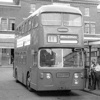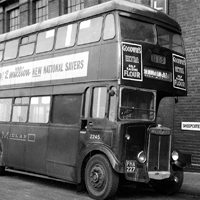Service 118: Service History
Introduction
Service 118
On Monday 1st January 1912, Birmingham Corporation took control of all tram operations within the Birmingham City boundary, and were soon in the process of obtaining an Act of Parliament to also take control of omnibus operations wholly within their area. With the pending loss of some of their most important routes BMMO needed to find a new source of revenue and looked to introduce a new network of routes into Birmingham from locations outside of the City boundaries, which it was permitted to do on condition that it charged protective fares.
The first of these new routes was introduced on Wednesday 24th December 1913, running between Birmingham City Centre, Perry Barr, Great Barr, and Walsall, as Service 30.
On Saturday 16th May 1925, BMMO stage carriage services were renumbered into geographical groups, with services into Birmingham being in the range 101–211 (numbers 1–100 were left open for Birmingham Corporation). At this time, Service 30 was renumbered to become Service 1??.
Service 118 (1928–1973)
Operated by Birmingham and Midland Motor Omnibus Company Limited
On Saturday 11th February 1928, Birmingham and Midland Motor Omnibus Company Limited (BMMO—Midland “Red” Motor Services) again renumbered their network, and at this time the Birmingham and Walsall route that had been operated since 1913 as Service 30 became new Service 118.
Following an Act of Parliament in 1916, Walsall Corporation had control of all bus services within their territory, and thus BMMO were required to reimburse the Corporation for the section of the route between Great Barr and Walsall. Between 1916 and 1919 (while operated as Service 30) the reimbursement was fixed at £300 per year, then from 1919 after renegotiation the reimbursement was dependant on the total number of miles operated. The agreement changed again in 1933, and from this time Walsall Corporation set fares in line with other services in their area, and collected the receipts, then reimbursed BMMO based on the amount of miles operated.
Service 118 was one of the busiest routes on the BMMO network with an afternoon to early evening frequency of every 3-minutes during the Second World War, operated entirely with double-deck vehicles. Additional short-working journeys were operated as Service 119 between Birmingham and Great Barr (Scott Arms) during the evenings and during peak times as and when passenger numbers required the extra capacity.
After the War the overall number of journeys reduced to run every 6-minutes Monday to Friday, or every 5-minutes on Saturdays during the afternoon and early evening period, and between every 7 and 10-minutes at other times of the day. A regular timetable for short-working variation Service 119 was introduced to give extra capacity between Birmingham and Great Barr, and in addition All Night Service NS119 was introduced running hourly over the Service 119 route from 2330 in the evening to 0500 the following morning with a Minimum Fare of 6d. Operation of short-working variation Service 119 passed to Birmingham City Transport in 1958.
In July 1968, following a disagreement between BMMO and Walsall Corporation over reimbursements for the section of the route in the Corporation’s territory, Service 118 became a joint operation between BMMO and Walsall Corporation Transport, with the Corporation operating 39.5% of the total mileage. This arrangement lasted for less than 18-months as the business and operations of Walsall Corporation Transport became part of West Midlands Passenger Transport Executive (WMPTE) at formation on Wednesday 1st October 1969.
Service 118 was operated jointly by BMMO and WMPTE until Sunday 2nd December 1973, then from the following day WMPTE took control of all BMMO services operated wholly within the West Midland area. In 1975, WMPTE renumbered Service 118 to Service 51.


